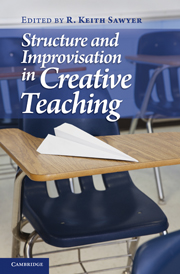Book contents
- Frontmatter
- Contents
- Table and Figures
- Notes on Contributors
- Foreword
- 1 What Makes Good Teachers Great?
- Part 1 The Teacher Paradox
- 2 Professional Improvisation and Teacher Education
- 3 Creativity, Pedagogic Partnerships, and the Improvisatory Space of Teaching
- 4 Improvising within the System
- 5 Teaching for Creativity with Disciplined Improvisation
- Part 2 The Learning Paradox
- Part 3 The Curriculum Paradox
- Index
- References
2 - Professional Improvisation and Teacher Education
Opening the Conversation
Published online by Cambridge University Press: 05 June 2012
- Frontmatter
- Contents
- Table and Figures
- Notes on Contributors
- Foreword
- 1 What Makes Good Teachers Great?
- Part 1 The Teacher Paradox
- 2 Professional Improvisation and Teacher Education
- 3 Creativity, Pedagogic Partnerships, and the Improvisatory Space of Teaching
- 4 Improvising within the System
- 5 Teaching for Creativity with Disciplined Improvisation
- Part 2 The Learning Paradox
- Part 3 The Curriculum Paradox
- Index
- References
Summary
In this chapter, I argue that teacher educators should help their students understand that teaching is inherently improvisational. I propose this as part of a larger shift that, I believe, needs to occur in teaching: We need to redefine our profession as an improvisational one. By this I mean that we should liken teaching to other explicitly improvisational professions such as unscripted theater and jazz music, where conscious efforts are made to develop improvisational expertise, and where a body of knowledge has been built up for doing so. This chapter uses the improvisation metaphor to extend the tradition of research on teacher expertise (summarized in Sawyer’s introduction) that has found that expert teachers have mastered a large repertoire of scripts, plans, and routines, while at the same time becoming experts at appropriate and disciplined improvisation in practice. This reconceptualization of teacher expertise will be an important move toward supporting the kinds of teaching that are needed to meet the demands of our society in the twenty-first century.
- Type
- Chapter
- Information
- Structure and Improvisation in Creative Teaching , pp. 27 - 50Publisher: Cambridge University PressPrint publication year: 2011
References
- 20
- Cited by

